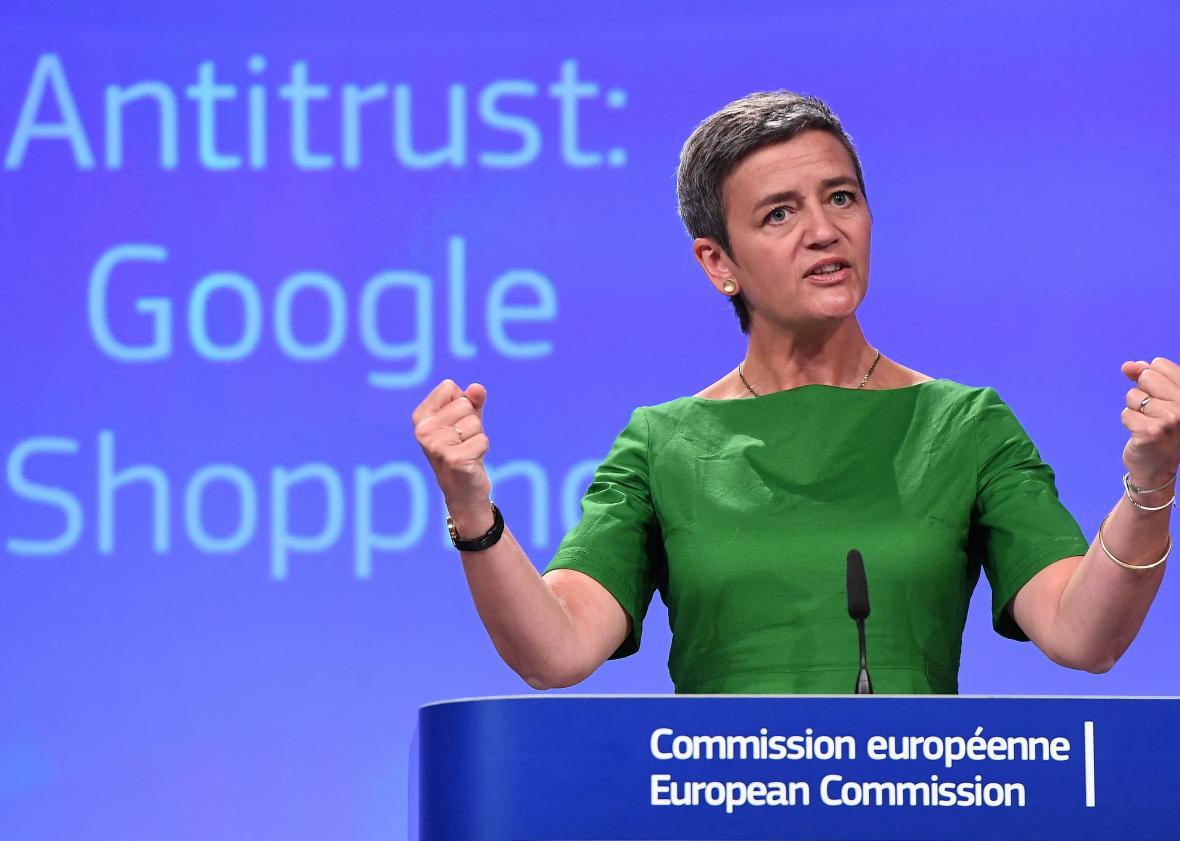Google’s massive bank account may just have gotten a tiny bit smaller. On Tuesday, European Union regulators slapped the Silicon Valley behemoth with a $2.7 billion antitrust fine.
At core, the penalty comes down to the way Google presents shopping results. Explaining the fine, EU antitrust chief Margrethe Vestager claimed that the company was unfairly promoting its own shopping comparison services higher than those of its rivals. “That is an abuse. It is illegal under European antitrust laws,” she said. Bloomberg writes that the European Competition Commission expects Google to “give equal treatment to rival price-comparison services. … It’s up to Google to choose how it does this and inform the EU of its plans within 60 days.”
This isn’t the first time that Google has come under fire for supposedly anticompetitive activities in the EU. In 2014, for example, the European Parliament considered a nonbinding resolution that would have called on search engine providers to uncouple that service from more commercial practices. More recently, Vestager charged that the company was suppressing competition on Android devices by pushing its own apps and services onto consumers. The Federal Trade Commission has conducted similar investigations of Google in the United States over the last decade, though the two ultimately learned to get along.
In an official blog post, Google general counsel Kent Walker responded to the fine by arguing that Google’s shopping comparison results provide a service to consumers. “While some comparison shopping sites naturally want Google to show them more prominently, our data shows that people usually prefer links that take them directly to the products they want, not to websites where they have to repeat their searches,” Walker wrote. By way of example, his post provides an image of comparison results for “puma shoes” that includes links to five different European retailers.
While conducting a similar search in the United States yield similar results at the top of the page, the real story may be in the information box that accompanies the “sponsored” acknowledgment in the upper left-hand corner of the results. Pulling up that notification informs users that “Google may be compensated by some of these providers.” In other words, while those results may be convenient, Google is all but showing us advertisements when it pulls them up. If the company’s “data” does, indeed, reveal that this is what users want, it’s using that data to take advantage of our own inclinations.
Moreover, there’s no guarantee we’re seeing the best possible deals, despite the semblance of definite authority. And though other companies provide similar comparative shopping results, Google’s setup makes it less likely that consumers will find their way to those alternative sites. It’s this risk—the very real possibility that Google is suppressing the results of its competitors while promoting its own interests—that worries Vestager and other EU regulators.
The setup of these search results also gets at a larger problem with Google’s increasingly complicated search results, though it diverges somewhat from the EU’s immediate concerns. By design, the company’s infoboxes appear to cut through clutter, seemingly giving us a just-the-facts approach to whatever we’re looking for. Structurally, they’re given a position of authority on the page, literally framing information that pulls the eye. The trouble is that the company’s rationale for presenting that information can be opaque—and the information itself is sometimes even wrong.
These are problems that will likely persist, even if Google finds a way to respond to the Vestager’s concerns—as she has demanded that the company do within the next 90 days. Meanwhile, it’s possible that other, similar government actions may be coming in the years ahead. Amazon, for example, recently received a patent to minimize comparison shopping in its brick and mortar stores. Vigorous antitrust efforts may provide an important check on such corporate projects, but it’s still worth remembering that information technologies are never far from technologies of control.
